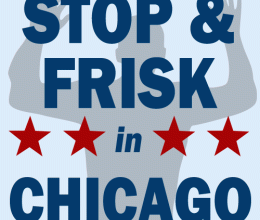
On January 1, 2017, the CBS News program 60 Minutes aired a segment titled “Crisis in Chicago” exploring Chicago’s gun violence epidemic. The ACLU of Illinois’ Karen Sheley, Director of the Police Practice Project, sent the following letter pointing out a number of troubling omissions to the piece.
January 4, 2017
60 Minutes
CBS News
524 West 57th Street
New York, NY 10019
To 60 Minutes:
Bill Whitaker’s January 1st report “Crisis in Chicago” omits critical facts in reviewing the serious problems of crime and gun violence in the City of Chicago. The report focuses on the recent decrease in the number of street stops following an agreement between the ACLU of Illinois, Chicago Police Department (CPD) and City of Chicago, concluding that this decrease explains the dramatic rise in shootings and gun deaths.
This assumption ignores the real problems that Chicago is facing. The rise in violent crime sadly is concentrated in a handful of neighborhoods of color, neighborhoods hit hard by our state government’s failure to pass a budget, the closing of important human services, and cuts to programs that address and prevent violence. At the same time, the City faces the complete breakdown of trust between the police and the public, fueled by the City’s failure to discipline and fire abusive officers.
Importantly, 60 Minutes omits the fact that criminologists have found no relationship between street stops and crime rates. In New York, when the number of stops dropped, so did crime. Studies of stop and frisk in Chicago indicate that the stops were low value and generated based on pressure to make large numbers of stops, rather than have high quality interactions with community members.
Rather than considering these root problems, your report featured complaints by anonymous officers and a superintendent dismissed in the wake of scandal. They claimed that Chicago’s rising gun violence is related to the modest protections for constitutional rights required by a recent settlement with the ACLU of Illinois.
In doing so, the report ignores that street stops or “stop and frisk” was used at an unacceptable rate in Chicago prior to the August 2015 agreement. You neglected to note that in the summer of 2014 alone – over just four months – Chicago police made more than a quarter of a million street stops (mostly of young men of color). To give context, Chicago police were stopping people at four times the rate of New York police at the height of their stop and frisk program, which a federal court found unconstitutional. Certainly no one can argue that these stops – which former officer Richard Wooten described as a literal “strip search” – improves safety and security in the City.
60 Minutes’ piece also omits important details about the outcome of the decreased stops in Chicago. A closer look reveals that while the number of stops has fallen, gun seizures by CPD (a main justification for such stops) actually increased by 20% during 2016. This data point suggests that policing can be conducted both effectively and with supervision.
Another oversight in the 60 Minutes piece is the suggestion that a new form introduced after the ACLU/CPD agreement in 2015 has unfairly burdened police officers. The suggestion in the piece is that the ACLU mandated the new “burdensome” form. This is not accurate. First, the form being used today asks for little additional information than the so-called “contact card” championed by then-police superintendent Garry McCarthy. The current form does require that Chicago document whether the stop results in a frisk or an arrest—mostly through the use of check boxes. This information has been collected without issue in other cities like Philadelphia and New York. The bulk of the form collects information not required under the agreement, such as where the person stopped works or goes to school. The ACLU already accommodated the CPD on changes to the form, and is willing to discuss further changes. However, police must justify to their supervisors and the public that stops are based on suspected criminal activity, not simply that a young man of color is present on the streets. The unchecked power to stop someone is what led to Chicago’s stop and frisk problem in the first place.
Underlying the 60 Minutes piece is an assumption that abusive community interactions will result in a drop in crime. But the most effective way to address violence in poor, black neighborhoods is to address economic disparity and improve education and youth programs, not increase unconstitutional contacts between police and innocent community members.
We would have been happy to share our perspective with you on these critical issues had 60 Minutes reached out to us before presenting this segment. It would have prevented the omission of these important facts and better shaped the discussion of a matter critical to our city.
Sincerely,
Karen Sheley, Director
Police Practice Project
American Civil Liberties Union of Illinois